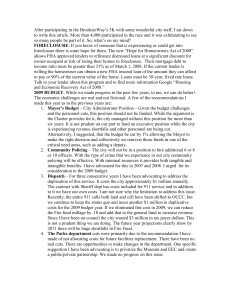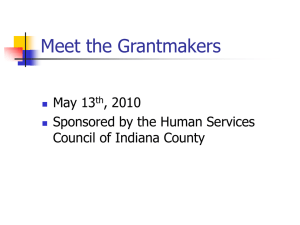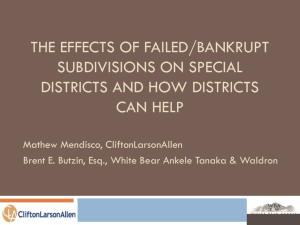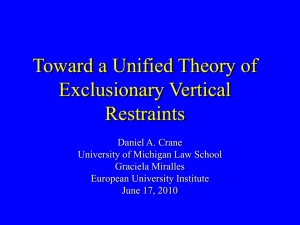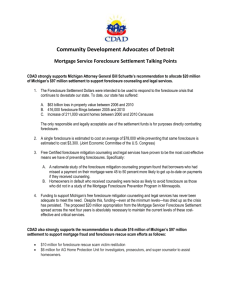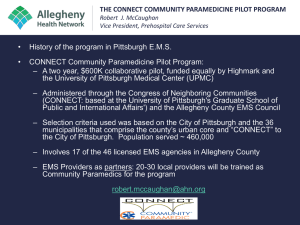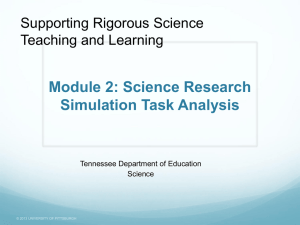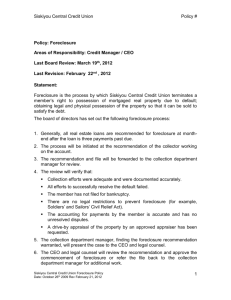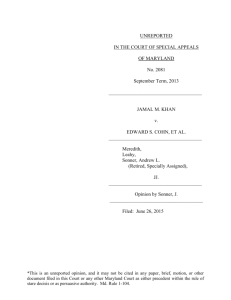hb-712-land-bank-bill-analysis-for-pgh
advertisement
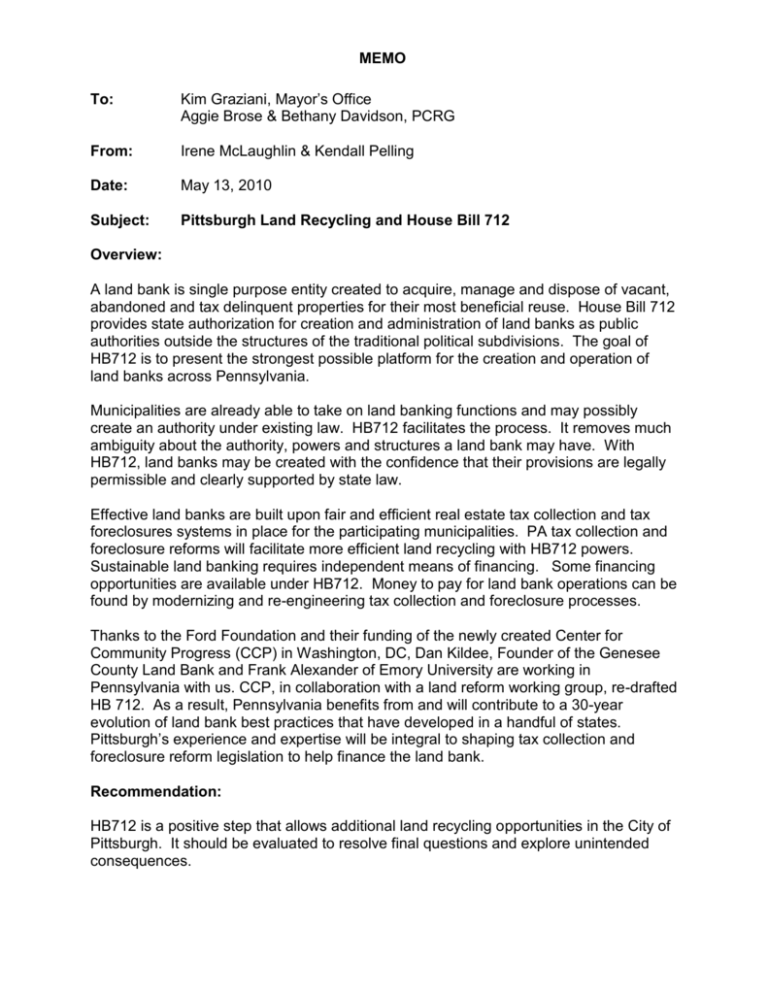
MEMO To: Kim Graziani, Mayor’s Office Aggie Brose & Bethany Davidson, PCRG From: Irene McLaughlin & Kendall Pelling Date: May 13, 2010 Subject: Pittsburgh Land Recycling and House Bill 712 Overview: A land bank is single purpose entity created to acquire, manage and dispose of vacant, abandoned and tax delinquent properties for their most beneficial reuse. House Bill 712 provides state authorization for creation and administration of land banks as public authorities outside the structures of the traditional political subdivisions. The goal of HB712 is to present the strongest possible platform for the creation and operation of land banks across Pennsylvania. Municipalities are already able to take on land banking functions and may possibly create an authority under existing law. HB712 facilitates the process. It removes much ambiguity about the authority, powers and structures a land bank may have. With HB712, land banks may be created with the confidence that their provisions are legally permissible and clearly supported by state law. Effective land banks are built upon fair and efficient real estate tax collection and tax foreclosures systems in place for the participating municipalities. PA tax collection and foreclosure reforms will facilitate more efficient land recycling with HB712 powers. Sustainable land banking requires independent means of financing. Some financing opportunities are available under HB712. Money to pay for land bank operations can be found by modernizing and re-engineering tax collection and foreclosure processes. Thanks to the Ford Foundation and their funding of the newly created Center for Community Progress (CCP) in Washington, DC, Dan Kildee, Founder of the Genesee County Land Bank and Frank Alexander of Emory University are working in Pennsylvania with us. CCP, in collaboration with a land reform working group, re-drafted HB 712. As a result, Pennsylvania benefits from and will contribute to a 30-year evolution of land bank best practices that have developed in a handful of states. Pittsburgh’s experience and expertise will be integral to shaping tax collection and foreclosure reform legislation to help finance the land bank. Recommendation: HB712 is a positive step that allows additional land recycling opportunities in the City of Pittsburgh. It should be evaluated to resolve final questions and explore unintended consequences. How will HB 712 impact Pittsburgh’s land recycling efforts? Advantages: HB712 provides options and opportunities only, no obligations by using “may” and not “shall” language; it is enabling legislation Clearly permits a Land Bank to have the all the powers they generally need. This would make the Pittsburgh process simpler by reducing the ambiguity about what we can or cannot legally do. Permits a structure that has most of the new revenue tools that are used by the Genesee County Land Bank – revenue bonds/DTAN’s, 5 year 50% tax recapture ,etc… Proposes desirable changes to tax foreclosure laws as they relate to land banks. The Land bank bill does not preclude other innovative approaches that are not explicitly allowed by the bill. Proposes an expedited quiet title process for land bank properties (this needs to be further evaluated) Pittsburgh Land Reserve can continue unaffected by enactment of HB712 if we choose not to form a separate authority. Disadvantages: TIF is not explicitly granted. Would this require other legislative changes? This bill does not fully revise tax foreclosure statutes to improve land bank operations and finances. Additional bills would be required with regard to. o Current statutory maximum interest rates of at most 12% o Minimal service provisions in the Treasurer’s sale o Title clearing challenges o Non-judicial T-sale versus one event, single free and clear judicial sale If the founders of a land bank want powers that are not specifically permitted, they will have to figure out if such powers are permitted through other laws. This situation would be worse without HB 712 A land Bank may not use Eminent Domain – though maybe we would not want this power anyway. The county vacant properties process does use eminent domain, and we should evaluate this tool that could be excluded from land bank use. Any public body can transfer any property to a land bank once they own it, so there is the potential to land bank property that has been acquired by the public through eminent domain via a separate entity. Sets clear parameters for organizational structure and operations. While these are probably fine, their constraints should be evaluated further. Sets school districts in a separate category. This allows them to potentially opt out of certain provisions, like compromising taxes, having board representation, etc.. We would not want to allow the school district to opt out, though this could be accomplished through an intergovernmental cooperation agreement. Does not specifically provide for the inclusion of other public authorities (like PWSA) in the creation of the land bank. While it is not excluded, having a provision for their inclusion could smooth the path to having PWSA in the land bank, and the Land bank having the power to compromise their charges. Requires Land banks to maintain properties according to city code. Does not explicitly define tax foreclosure acquisitions as an “involuntary taking”. Involuntary taking language was used in Michigan to limit liability for environmental contamination. Comparison of existing land recycling provisions and the HB712 Land Bank Bill: Pittsburgh Land Reserve Creation by Memorandum of Understanding using existing City of Pittsburgh powers House Bill 712 Land Bank a municipality, or jointly created by municipalities,(a county is defined as a municipality) with participation from school district(s), and governed by a board of directors in accordance with corporate bylaws, intergovernmental cooperation agreements (ICA), and, corporate policies and procedures. Acquires property by tax foreclosure initiated by city, qualified community development corporations (CDC’s) and URA (identify properties for tax sale) by tax foreclosure initiated by participating municipality, or the land bank (if liens are assigned to land bank); able to be the successful bidder without actually paying the upset price by any form of real property transfer (purchase, donation, exchange, etc..) in any manner, from any source no power of eminent domain Title & Real Estate Tax Exemption property titled to City of Pittsburgh, title is in the name of the land bank, properties in land thereby tax exempt bank exempt from real estate taxes back taxes compromised by 3TB agreement Manages ICA amongst participating taxing bodies and tax foreclosure procedures governs back taxes city is self-insured for liability may procure insurance assembles properties for qualified CDC redevelopment; assembles properties in areas both served and unserved by qualified CDCs; maintains properties maintains properties demolishes properties demolishes properties redevelopment with URA collaboration redevelops properties, on its own, or in partnerships, joint ventures etc. no leasing leases property; funded by the city operating budget and the proceeds of the 3 taxing bodies agreement may receive funds from various sources, receive & retain payments for services rendered, rents, etc. may borrow and issue revenue bonds city staff perform functions any staffing arrangements possible public inventory required Disposes of property to CDCs at very affordable acquisition cost for redevelopment – sales must be approved by City Council and follow public disposition processes. to any transferee in accordance with policies set by the board of the Land Bank. to the public according to approved procedures maximum flexibility in disposition and approval processes proceeds distributed according to the 3TBA broad flexibility to contract for services, such as marketing properties for sale, other services. Flexible contracting requirements. not governed by Redevelopment Authority Law & procedures minimal marketing ability may set priorities for the re-use of property and limit transfers accordingly consideration can be non-monetary (commitments, development agreements, other actions valuable to the public) revenues stay in the Land Bank not governed by Redevelopment Authority Law & procedures
